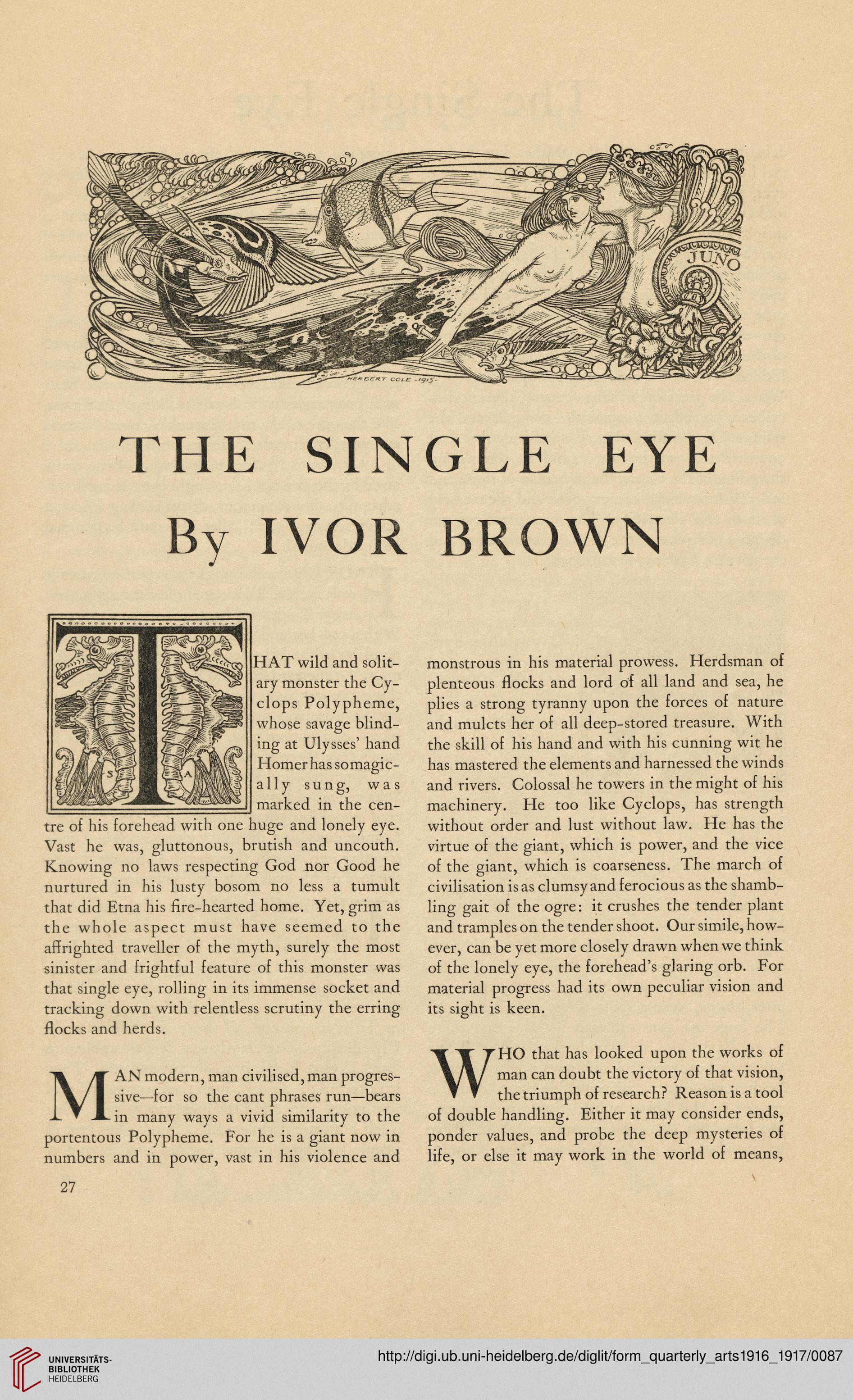THE SINGLE EYE
By IVOR BROWN
HAT wild and solit-
ary monster the Cy-
clops Polypheme,
whose savage blind-
ing at Ulysses’ hand
Homer has somagic-
ally sung, was
_ marked in the cen-
tre of his forehead with one huge and lonely eye.
Vast he was, gluttonous, brutish and uncouth.
Knowing no laws respecting God nor Good he
nurtured in his lusty bosom no less a tumult
that did Etna his fire-hearted home. Yet, grim as
the whole aspect must have seemed to the
affrighted traveller of the myth, surely the most
sinister and frightful feature of this monster was
that single eye, rolling in its immense socket and
tracking down with relentless scrutiny the erring
flocks and herds.
MAN modern, man civilised,man progres-
sive—for so the cant phrases run—bears
in many ways a vivid similarity to the
portentous Polypheme. For he is a giant now in
numbers and in power, vast in his violence and
monstrous in his material prowess. Herdsman of
plenteous flocks and lord of all land and sea, he
plies a strong tyranny upon the forces of nature
and mulcts her of all deep-stored treasure. With
the skill of his hand and with his cunning wit he
has mastered the elements and harnessed the winds
and rivers. Colossal he towers in the might of his
machinery. He too like Cyclops, has strength
without order and lust without law. He has the
virtue of the giant, which is power, and the vice
of the giant, which is coarseness. The march of
civilisation isas clumsyand ferocious as the shamb-
ling gait of the ogre: it crushes the tender plant
and tramples on the tender shoot. Our simile, how-
ever, can be yet more closely drawn when we think
of the lonely eye, the forehead’s glaring orb. For
material progress had its own peculiar vision and
its sight is keen.
WHO that has looked upon the works of
man can doubt the victory of that vision,
the triumph of research? Reason is a tool
of double handling. Either it may consider ends,
ponder values, and probe the deep mysteries of
life, or else it may work in the world of means,
27
By IVOR BROWN
HAT wild and solit-
ary monster the Cy-
clops Polypheme,
whose savage blind-
ing at Ulysses’ hand
Homer has somagic-
ally sung, was
_ marked in the cen-
tre of his forehead with one huge and lonely eye.
Vast he was, gluttonous, brutish and uncouth.
Knowing no laws respecting God nor Good he
nurtured in his lusty bosom no less a tumult
that did Etna his fire-hearted home. Yet, grim as
the whole aspect must have seemed to the
affrighted traveller of the myth, surely the most
sinister and frightful feature of this monster was
that single eye, rolling in its immense socket and
tracking down with relentless scrutiny the erring
flocks and herds.
MAN modern, man civilised,man progres-
sive—for so the cant phrases run—bears
in many ways a vivid similarity to the
portentous Polypheme. For he is a giant now in
numbers and in power, vast in his violence and
monstrous in his material prowess. Herdsman of
plenteous flocks and lord of all land and sea, he
plies a strong tyranny upon the forces of nature
and mulcts her of all deep-stored treasure. With
the skill of his hand and with his cunning wit he
has mastered the elements and harnessed the winds
and rivers. Colossal he towers in the might of his
machinery. He too like Cyclops, has strength
without order and lust without law. He has the
virtue of the giant, which is power, and the vice
of the giant, which is coarseness. The march of
civilisation isas clumsyand ferocious as the shamb-
ling gait of the ogre: it crushes the tender plant
and tramples on the tender shoot. Our simile, how-
ever, can be yet more closely drawn when we think
of the lonely eye, the forehead’s glaring orb. For
material progress had its own peculiar vision and
its sight is keen.
WHO that has looked upon the works of
man can doubt the victory of that vision,
the triumph of research? Reason is a tool
of double handling. Either it may consider ends,
ponder values, and probe the deep mysteries of
life, or else it may work in the world of means,
27




